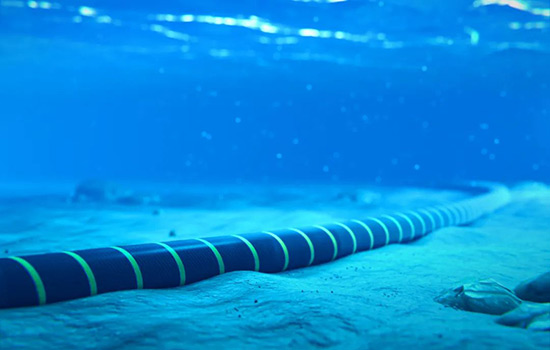

Das Seekabel im Bild hat einen dicken Kabelmantel.
Der Unterwasserkabelbau gilt weltweit als schwieriges und komplexes technisches Großprojekt.
Sowohl das Kabeldesign, Herstellung, und Verlegekonstruktion sind viel höher als bei anderen allgemeinen Kabelprodukten.
Darunter, sind die Zwischenverbindungen von Unterseekabeln, die Produktion von Terminals, Installation, und Verkabelung. Und auch die Testinbetriebnahme ist ein sehr wichtiger Teil dieser komplexen technischen Entwicklung.
Seine Produktion, und Installationsqualität sind gut oder schlecht, und die Sicherheit und Zuverlässigkeit der gesamten Übertragungs- und Umspannstation spielen eine sehr wichtige Rolle.
Unterseekabel werden in Flüssen verlegt, Seen, und Meere Unterwasser-Stromkabel, auch Unterwasserkabel genannt.
Es wird mit landgestützten Kabeln verglichen, Bei der Hauptisolierung gibt es kaum Unterschiede.
Aufgrund der besonderen Bauweise und Betriebsbedingungen von Seekabeln, in der Rüstung, Metallmantel, Herstellungslänge. Und andere strukturelle Aspekte der größeren Unterschiede.
Unterseekabel werden häufig in großen Längen von ganzen Kabeln hergestellt, die für den Transport zu Kreisen gewickelt werden müssen.


Allerdings kann die Panzerung mit kurzer Steigung den Wickeldurchmesser verringern. Das Unterseekabel mit Short-Pitch-Armierung lässt sich leicht unter Wasser verknoten, wenn es beim Verlegen unter großer Spannung steht.
Deshalb, Die allgemeine Panzerungsneigung benötigt das 12- bis 14-fache des durchschnittlichen Panzerungsdurchmessers.
Zur Reduzierung des Wickeldurchmessers, Einige verwenden vorgespannten Stahldraht mit kurzer Steigung oder Doppeldraht Stahldrahtpanzerung, und einige verwenden Panzerungen mit der entgegengesetzten Richtung der inneren und äußeren Drehung.
Hauptsächlich unterteilt in dreiadriges Unterseekabel und einadriges Unterseekabel, niedrig- und Mittelspannungsleitungen mittels eines dreiadrigen Seekabels. Und Hochspannungsleitungen Verwendung eines einadrigen Seekabels.
Vor einem halben Jahrhundert, Das Unterseekabel hat nur eine einfache Funktion zur Übertragung elektrischer Energie.
Nun integriert das Seekabel zwei Funktionen, die Übertragung von elektrischer Energie und Signalen auf demselben Kabel effektiv realisieren.
Es gibt ölgefüllte isolierte Unterseekabel und mit extrudiertem Kunststoff isolierte Unterseekabel.
Es gibt DC- und AC-Kabel.
DC-Seekabel zeichnen sich durch geringe Verluste aus, einfach zu erreichende Kraftübertragung über große Entfernungen.
Jedoch, Die Anwendungserfahrung von DC-Unterseekabeln ist nicht reichhaltig. Und die unterstützenden Baukosten für Konverterstationen und andere sind hoch.
Der Verlust von Wechselstrom-Unterwasserkabeln ist groß, aber die Betriebs- und Wartungstechnik ist ausgereift, Unterstützung der geringen Baukosten.
Deshalb, Entwickler von Unterseekabelleitungen müssen in der Regel technische und wirtschaftliche Kompromisse eingehen, um den Nutzen zu maximieren.
Die Kabelführungsuntersuchung vor der Verlegung von Seekabeln umfasst:
① Bereinigen Sie die Wassertiefe, Topographie, und flache stratigraphische Profilmessung des Offshore-Routengebiets.
② Sedimentoberflächenprobenahme, Säulenprobenahme, und statische Berührungsumfrage.
③ Dazu gehören auch Untersuchungen der Verkehrs- und Baubedingungen sowie von Hindernissen, die den Status der Meeresentwicklungsaktivitäten widerspiegeln.
In letzter Zeit, die Verwendung fortschrittlicher GPS-Nachbearbeitungspositionierung und (CPT) statische Touch-Technologie hat zu einer deutlichen Steigerung der Umfragegeschwindigkeit und -effektivität geführt.
Das Unterseekabelverlegungsprojekt wird von Ländern auf der ganzen Welt als komplexes und schwieriges Großprojekt anerkannt.
Beim Verlegen des Kabels sollte der Winkel des Kabels im Wasser und die Verlegespannung durch Steuerung der Fahrgeschwindigkeit des Verlegeschiffs und der Kabelfreigabegeschwindigkeit kontrolliert werden, um eine Beschädigung des Kabels durch einen zu kleinen Biegeradius oder eine zu große Spannung zu vermeiden.
In flachen Meeren, wie Wassertiefe von weniger als 200 Meter im Meer, Das Kabel ist vergraben.
In der Tiefsee, Das Kabel ist verlegt, und das Kabel wird vom Kabelverlegeschiff freigegeben. Und das Kabel wird ständig mit Unterwassermonitoren und ferngesteuerten Unterwasserfahrzeugen überwacht und justiert.
Ebenfalls, Kontrollieren Sie die Vorwärtsgeschwindigkeit und -richtung des Verlegeschiffs sowie die Geschwindigkeit beim Verlegen des Kabels, um eine Beschädigung des Kabels durch Umfahren von Unebenheiten und Felsen zu vermeiden.
In der letzten Bauphase, Der Hauptzweck besteht darin, das Unterseekabel durch tiefe Verlegung zu schützen, um die Auswirkungen der komplexen Meeresumwelt auf das Unterseekabel zu verringern und die Betriebssicherheit zu gewährleisten.
Im sandigen und schlammigen Bereich, ein Graben herum 2 Metertiefe wird durch Hochdruckspülwasser erzeugt, um das Kabel darin zu vergraben, und der sandige Boden daneben bedeckt es.
Für Korallenriffe und Lehmgebiete, einen Graben schneiden 0.6 – 1.2 Meter tief mit einem Fräser, Vergraben Sie das Kabel im Graben und verfüllen Sie ihn auf natürliche Weise, um einen Schutz zu schaffen.
In Hartgesteinsgebieten, Zum Schutz muss das Kabel mit einer Zementabdeckung und anderen harten Gegenständen abgedeckt werden.
Es handelt sich um einen mit Isoliermaterial umwickelten Draht, um das Wasser vom Kabel zu isolieren, und bietet somit eine wasserdichte Funktion.
Die Herstellung des Kabels erfolgt so, dass das Kabel zunächst in eine geleeartige Masse eingebettet wird, die das Kabel auch bei Kontakt mit Meerwasser vor Beschädigungen schützt.
Das Glasfaserkabel Anschließend wird es in ein Stahlrohr gepackt, um zu verhindern, dass es durch den Wasserdruck beschädigt wird.
Nächste, es ist mit einem insgesamt sehr starken Stahldraht umwickelt und in ein Kupferrohr eingerastet, und schlussendlich, Es wird eine Schutzschicht aus Polyethylenmaterial aufgetragen.
In der Nähe der Küste des Festlandsockels, Unterseekabel werden in der Regel mit leichteren Kabeln mit stärkeren Stahldrähten verlegt und mit einer Asphaltbeschichtung abgedeckt, um Korrosion durch Meerwasser zu verhindern.
Unterseeische Glasfaserkabel sind sehr anfällig für Meerwasserkorrosion, da sie über längere Zeiträume in hochkonzentriertes Meerwasser eingetaucht sind.
Zusätzlich, Wasserstoffmoleküle können in das Glasmaterial der Faser diffundieren, wodurch der Faserverlust größer wird.
Deshalb, Unterseeische Glasfaserkabel müssen sowohl die interne Erzeugung von Wasserstoff als auch das Eindringen von Wasserstoff in das Glasfaserkabel von außen verhindern.
Momentan, Unterwasser-Glasfaserkabel werden durch spiralförmiges Wickeln der ein- oder zweifach beschichteten Glasfaser um die Mitte und Verstärkungselementen um sie herum hergestellt.
Das Obige ist eine Einführung in Unterseekabel. Wenn Sie Fragen zum Kabelkauf haben, Willkommen bei ZMS-Kabel.
Wenn Menschen den Begriff mineralisch isoliertes Kabel hören, many immediately think of harsh environments like…
Wenn Telekommunikationsnetzwerke und Stromübertragungssysteme schnell wachsen, the demand for reliable and cost-effective…
In groß angelegten Öl- und Gasprojekten, Industriekabel sind nicht nur Zubehör—they are the "nervous…
In der Welt der elektrischen Verbindungen, Kabelschuhe—auch als Kabelohren oder Kabelklemmen bezeichnet—Sind…
Bei der Auswahl des richtigen Kautschukkabels für ein Elektrotechnikprojekt, it is critical to…
Liebe Partner und Kunden: 29. Januar, 2025 ist das chinesische Neujahr – Spring…